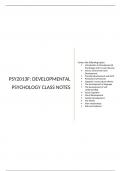Class notes
PSY2013F Social and Developmental Psychology: Developmental Psychology Notes
- Course
- Institution
This document provides lecture notes on the following topics: • • Introduction to Developmental Psychology and its main theories • Genes, Environment and Development • Prenatal development and birth • Postnatal environment • Vygotsky’s sociocultural theory • The development ...
[Show more]



